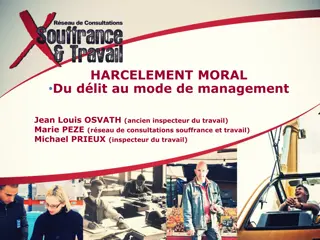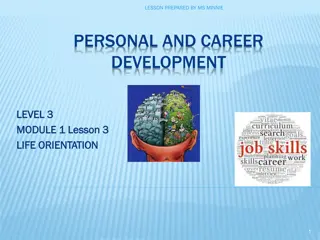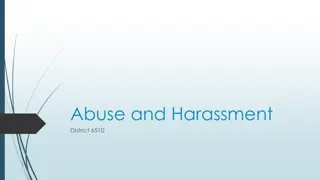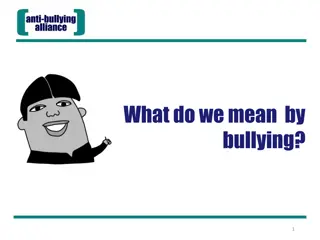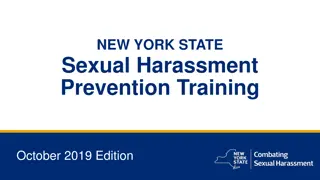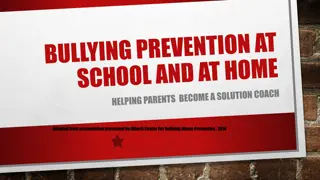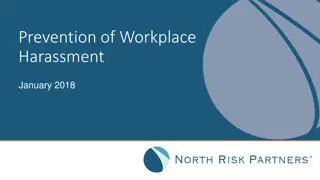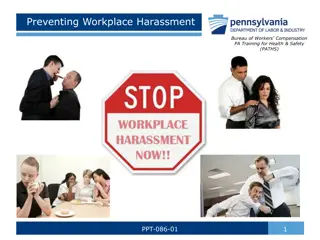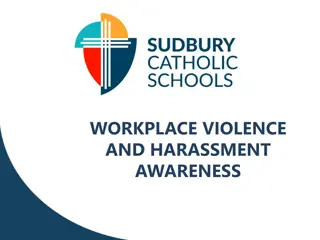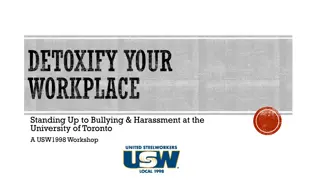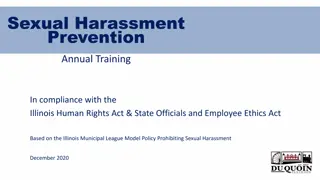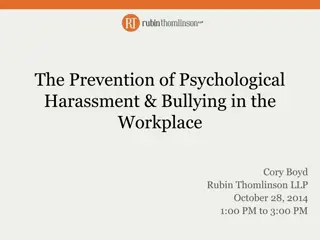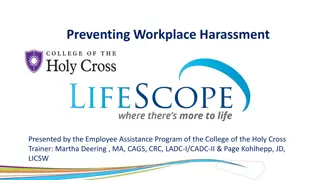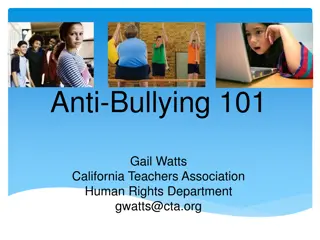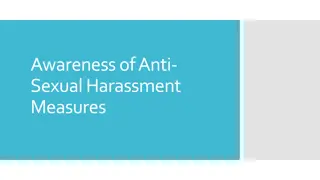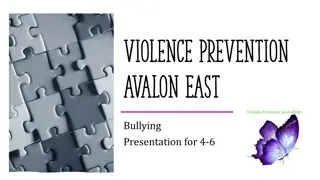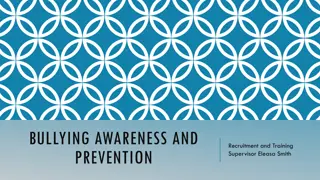Understanding and Preventing Workplace Bullying and Harassment
Explore the definitions and types of workplace bullying, harassment, and discrimination, along with their impact and reporting procedures. Learn to recognize and address behaviors such as verbal insults, social isolation, and sexual harassment. Promote a respectful and inclusive work environment where all employees feel safe and valued.
Download Presentation

Please find below an Image/Link to download the presentation.
The content on the website is provided AS IS for your information and personal use only. It may not be sold, licensed, or shared on other websites without obtaining consent from the author. Download presentation by click this link. If you encounter any issues during the download, it is possible that the publisher has removed the file from their server.
E N D
Presentation Transcript
Respectful Workplace Training LEARNING, GROWING, BELONGING TOGETHER
Session Objectives To understand: What bullying & harassment is & what it is not What the law on topic & district policy require Respective Roles & Responsibilities Reporting procedures
What is Bullying & Harassment? When a person takes action that they knew or reasonably ought to have known, would cause another employee to be humiliated or intimidated. The action could be any unwelcome behavior, comment or gesture, overt or subtle, that is likely to demean, humiliate, intimidate, or offend an individual There is no legitimate work-related purpose behind the action
What is Discriminatory Harassment or Bullying? The adverse treatment of an individual or group, whether intentional or not related to a prohibited ground of discrimination under the British Columbia Human Rights Code: Prohibited Grounds include: Race, Colour Ancestry, Place of Origin Political Belief, Religion Marital Status, Family Status Physical or mental disability Sex, Sexual Orientation, Gender Identity or Expression Age Conviction of a criminal or summary conviction offence (unrelated to employment)
Examples may include: Cartoons or other visual displays of objects, pictures or posters that depict persons in a derogatory way Verbal or written insults, slurs, jokes about a person, personal attacks Sabotaging work/ hiding tools Exclusion or social isolation Spreading malicious rumours/ cyber bullying Purposely withholding vital information Excessive micro-managing of work
What is Sexual Harassment? Any conduct, comment, gesture or contact of a sexual nature that is likely to cause offence or humiliation to an employee Perceived by employee that there is a condition of a sexual nature placed on their employment or for a training opportunity or promotion
Examples may include: Making sexual comments about a person s appearance, body or clothing Sending inappropriate messages via text, email or social media Asking someone about their romantic or sexual history Making inappropriate sexual gestures, remarks or facial expressions Sharing offensive or pornographic imagery Telling lewd jokes or sharing stories about sexual experiences Making insulting comments about someone s gender identify or sexual orientation
Who? Where? Harassment can come from co-workers, supervisors, employers, external sources Can come in the form of electronic communications (text, email, social media) Can occur at the worksite or during off site interactions
What isnotBullying & Harassment? Expressing differences of opinion Offering constructive feedback Making a legitimate complaint about another worker s conduct Reasonable management action, including decisions about: Job duties and work to be performed Workloads and deadlines Layoffs, transfers, promotions and reorganizations Work instruction, supervision, or feedback Performance management Discipline, suspensions, terminations
Dealing with Incidents or Complaints Investigation may be conducted internally or externally Investigation conducted promptly and fairly Investigation information is confidential
Harassment can be Unintential Lack of intent to harass or bully is NOT a defense. The perception of the person who is the subject of the unwelcome behavior is important.
District Policy 4111.12 District Policy 4111.12 The Board is committed to ensuring a respectful workplace free from Discrimination Bullying or Harassment Workers MUST report if bullying or harassment is observed or experienced The Board MUST investigate all reports
SD #27 Reporting Procedures Employees are encouraged to bring their complaint to the attention of the person responsible for the conduct. There may be times when the person, who ought to have known, didn't realize their conduct had an impact on the other person and through discussion the issue can be resolved. If the employee is not comfortable or the conflict is too difficult: IUOE members Fill out School District #27 Bullying and Harassment Complaint form found here: Submit form to Manager of Human Resources if paper form is filled out (email: . ) CCTA members If the conflict is too difficult to resolve by speaking directly to the individual Fill out School District #27 Bullying and Harassment Complaint form found here: Submit form to your local administrator or Submit form to Manager of HR if paper form is filled out (email: . )
What MUST Workers Do? What MUST Workers Do? Report if you observe or experience bullying and harassment NOT engage in workplace bullying and harassment Apply and comply with workplace policies and procedures
What MUST Supervisors Do? NOT engage in workplace bullying and harassment Apply and comply with workplace policies and procedures
Review Harassment and Bullying will not be tolerated It is an expectation that all workers will treat each other in a professional, respectful manner If you experience and or witness harassment and bullying, you MUST report it Legal requirement to report through WorkSafe BC
Please direct any questions to Manager of HR or the Assistant Superintendent.



